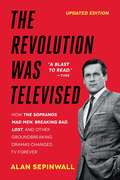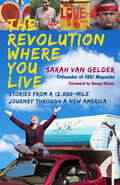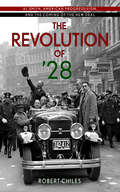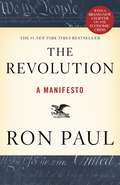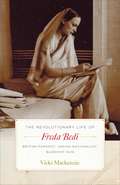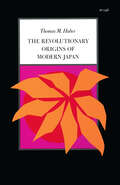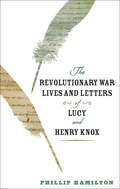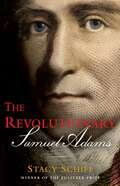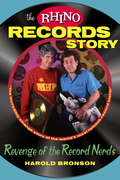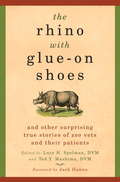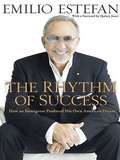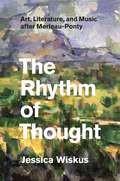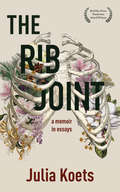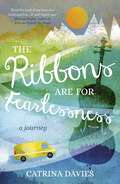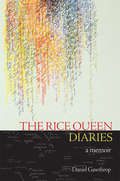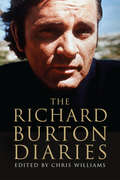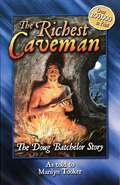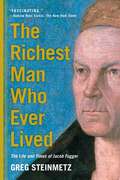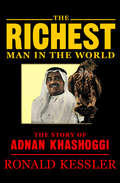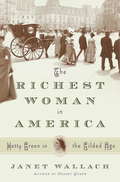- Table View
- List View
The Revolution Was Televised: The Cops, Crooks, Slingers, and Slayers Who Change
by Alan SepinwallA phenomenal account, newly updated, of how twelve innovative television dramas transformed the medium and the culture at large, featuring Sepinwall's take on the finales of Mad Men and Breaking Bad.In The Revolution Was Televised, celebrated TV critic Alan Sepinwall chronicles the remarkable transformation of the small screen over the past fifteen years. Focusing on twelve innovative television dramas that changed the medium and the culture at large forever, including The Sopranos, Oz, The Wire, Deadwood, The Shield, Lost, Buffy the Vampire Slayer, 24, Battlestar Galactica, Friday Night Lights, Mad Men, and Breaking Bad, Sepinwall weaves his trademark incisive criticism with highly entertaining reporting about the real-life characters and conflicts behind the scenes. Drawing on interviews with writers David Chase, David Simon, David Milch, Joel Surnow and Howard Gordon, Damon Lindelof and Carlton Cuse, and Vince Gilligan, among others, along with the network executives responsible for green-lighting these groundbreaking shows, The Revolution Was Televised is the story of a new golden age in TV, one that's as rich with drama and thrills as the very shows themselves.
The Revolution Where You Live: Stories from a 12,000-Mile Journey Through a New America
by Sarah van GelderDiscover the Real Revolution Unfolding across AmericaAmerica faces huge challenges—climate change, social injustice, racist violence, economic insecurity. Journalist Sarah van Gelder suspected that there were solutions, and she went looking for them, not in the centers of power, where people are richly rewarded for their allegiance to the status quo, but off the beaten track, in rural communities, small towns, and neglected urban neighborhoods. She bought a used pickup truck and camper and set off on a 12,000-mile journey through eighteen states, dozens of cities and towns, and five Indian reservations. From the ranches of Montana to the coalfields of Kentucky to the urban cores of Chicago and Detroit, van Gelder discovered people and communities who are remaking America from the ground up. Join her as she meets the quirky and the committed, the local heroes and the healers who, under the mass media's radar, are getting stuff done. The common thread running through their work was best summed up by a phrase she saw on a mural in Newark: “We the People LOVE This Place.” That connection we each have to our physical and ecological place, and to our human community, is where we find our power and our best hopes for a new America.
The Revolution of ’28: Al Smith, American Progressivism, and the Coming of the New Deal
by Robert ChilesThe Revolution of ’28 explores the career of New York governor and 1928 Democratic presidential nominee Alfred E. Smith. Robert Chiles peers into Smith’s work and uncovers a distinctive strain of American progressivism that resonated among urban, ethnic, working-class Americans in the early twentieth century. The book charts the rise of that idiomatic progressivism during Smith’s early years as a state legislator through his time as governor of the Empire State in the 1920s, before proceeding to a revisionist narrative of the 1928 presidential campaign, exploring the ways in which Smith’s gubernatorial progressivism was presented to a national audience. As Chiles points out, new-stock voters responded enthusiastically to Smith's candidacy on both economic and cultural levels.Chiles offers a historical argument that describes the impact of this coalition on the new liberal formation that was to come with Franklin Delano Roosevelt’s New Deal, demonstrating the broad practical consequences of Smith’s political career. In particular, Chiles notes how Smith’s progressive agenda became Democratic partisan dogma and a rallying point for policy formation and electoral success at the state and national levels. Chiles sets the record straight in The Revolution of ’28 by paying close attention to how Smith identified and activated his emergent coalition and put it to use in his campaign of 1928, before quickly losing control over it after his failed presidential bid.
The Revolution: A Manifesto
by Ron Paul#1 NEW YORK TIMES BESTSELLERThis much is true: You have been lied to. The government is expanding. Taxes are increasing. More senseless wars are being planned. Inflation is ballooning. Our basic freedoms are disappearing. The Founding Fathers didn't want any of this. In fact, they said so quite clearly in the Constitution of the United States of America. Unfortunately, that beautiful, ingenious, and revolutionary document is being ignored more and more in Washington. If we are to enjoy peace, freedom, and prosperity once again, we absolutely must return to the principles upon which America was founded. But finally, there is hope . . . In THE REVOLUTION, Texas congressman and presidential candidate Ron Paul has exposed the core truths behind everything threatening America, from the real reasons behind the collapse of the dollar and the looming financial crisis, to terrorism and the loss of our precious civil liberties. In this book, Ron Paul provides answers to questions that few even dare to ask. Despite a media blackout, this septuagenarian physician-turned-congressman sparked a movement that has attracted a legion of young, dedicated, enthusiastic supporters . . . a phenomenon that has amazed veteran political observers and made more than one political rival envious. Candidates across America are already running as "Ron Paul Republicans.""Dr. Paul cured my apathy," says a popular campaign sign. THE REVOLUTION may cure yours as well.
The Revolutionary Age of Andrew Jackson
by Robert V. ReminiThis is about the changes that took place during the fifty years between the War of 1812 and the Civil War called the Age of Jackson in America that witnessed the threat from slavery resulting in power struggle between the President and the Congress.
The Revolutionary Life of Freda Bedi: British Feminist, Indian Nationalist, Buddhist Nun
by Vicki MackenzieA fascinating biography of Freda Bedi, an English woman who broke all the rules of gender, race, and religious background to become both a revolutionary in the fight for Indian independence and then a Buddhist icon.She was the first Western woman to become a Tibetan Buddhist nun—but that pioneering ordination was really just one in a life full of revolutionary acts. Freda Bedi (1911–1977) broke the rules of gender, race, and religion—in many cases before it was thought that the rules were ready to be challenged. She was at various times a force in the struggle for Indian independence, spiritual seeker, scholar, professor, journalist, author, social worker, wife, and mother of four children. She counted among her friends, colleagues, and teachers Mohandas Gandhi, Jawaharlal Nehru, Indira Gandhi, the Dalai Lama, Chögyam Trungpa Rinpoche, and many others. She was a woman of spiritual focus and compassion who was also not without contradictions. Vicki Mackenzie gives a nuanced view of Bedi and of the forces that shaped and motivated this complex and compelling figure.
The Revolutionary Origins of Modern Japan
by Thomas M. HuberChallenging the popular view of the Meiji Restoration as a "revolution from above," this book argues that its main cause was neither the growing threat of the West nor traditional loyalty to Emperor and nation, but rather lay in class conflict and long-term institutional change. The author sees the Restoration as a revolution against feudal privilege carried out from below by a service intelligentsia of minor administrators, priests, scholars, and village officials. The book focuses on the politically most effective body of activists, those in the domain of Chōshū, and on their most important leaders of the 1850s and 1860s: Yoshida Shōin, Kusaka Genzui, and Takasugi Shinsaku. It examines their social and educational background, explores their motives for acting, and follows them through their intellectual and political struggles. The final chapter explains various heretofore puzzling aspects of the Meiji period (1868-1912) in terms of its revolutionary origins, and concludes by showing that the Restoration, far from being uniquely Japanese, had many of the characteristics we associate with the great revolutions of England, France, and Russia.
The Revolutionary War Lives and Letters of Lucy and Henry Knox
by Phillip HamiltonLove and marriage during the Revolutionary War through the letters of Lucy and Henry Knox.In 1774, Boston bookseller Henry Knox married Lucy Waldo Flucker, the daughter of a prominent Tory family. Although Lucy’s father was the third-ranking colonial official in Massachusetts, the couple joined the American cause after the Battles of Lexington and Concord and fled British-occupied Boston. Knox became a soldier in the Continental Army, where he served until the war’s end as Washington’s artillery commander.While Henry is well known to historians, his private life and marriage to Lucy remain largely unexplored. Phillip Hamilton tells the fascinating story of the Knoxes’ relationship amid the upheavals of war. Like John and Abigail Adams, the Knoxes were often separated by the revolution and spent much of their time writing to one another. They penned nearly 200 letters during the conflict, more than half of which are reproduced and annotated for this volume.This correspondence—one of the few collections of letters between revolutionary-era spouses that spans the entire war—provides a remarkable window into the couple’s marriage. Placed at the center of great events, struggling to cope with a momentous conflict, and attempting to preserve their marriage and family, the Knoxes wrote to each other in a direct and accessible manner as they negotiated shifts in gender and power relations. Working together, Henry and Lucy maintained their household and protected their property, raised and educated their children, and emotionally adjusted to other dramatic changes within their family, including a total break between Lucy and her Tory family. Combining original epistles with Hamilton’s introductory essays, The Revolutionary War Lives and Letters of Lucy and Henry Knox offers important insights into how this relatable and highly individual couple overcame the war’s challenges.
The Revolutionary War Lives and Letters of Lucy and Henry Knox
by Phillip Hamilton“[This] collection of Lucy and Henry Knox’s correspondence movingly reveals a marriage and a nation coming of age in the crucible of the Revolutionary War.” —Lorri Glover, author of Eliza Lucas PinckneyIn 1774, Boston bookseller Henry Knox married Lucy Waldo Flucker, the daughter of a prominent Tory family. Although Lucy’s father was the third-ranking colonial official in Massachusetts, the couple joined the American cause after the Battles of Lexington and Concord and fled British-occupied Boston. Knox became a soldier in the Continental Army, where he served until the war’s end as Washington’s artillery commander.Their correspondence—one of the few collections of letters between revolutionary-era spouses that spans the entire war—provides a remarkable window into the couple’s marriage. Placed at the center of great events, struggling to cope with a momentous conflict, and attempting to preserve their marriage and family, the Knoxes wrote to each other in a direct and accessible manner as they negotiated shifts in gender and power relations. Working together, Henry and Lucy maintained their household and protected their property, raised and educated their children, and emotionally adjusted to other dramatic changes within their family, including a total break between Lucy and her Tory family. Combining original epistles with Hamilton’s introductory essays, The Revolutionary War Lives and Letters of Lucy and Henry Knox offers important insights into how this relatable and highly individual couple overcame the war’s challenges.“A fascinating and important addition to the literature of marriage and family life during the revolution. These unique letters, punctuated by excellent narrative interludes, provide a rich vein of information about the war.” —Edith B. Gelles, author of Abigail and John: Portrait of a Marriage
The Revolutionary: Samuel Adams
by Stacy SchiffThis "glorious" revelatory biography from a Pulitzer Prize winner is about the most essential Founding Father (Ron Chernow)—the one who stood behind the change in thinking that produced the American Revolution. Thomas Jefferson asserted that if there was any leader of the Revolution, &“Samuel Adams was the man.&” With high-minded ideals and bare-knuckle tactics, Adams led what could be called the greatest campaign of civil resistance in American history. Stacy Schiff returns Adams to his seat of glory, introducing us to the shrewd and eloquent man who supplied the moral backbone of the American Revolution. A singular figure at a singular moment, Adams amplified the Boston Massacre. He helped to mastermind the Boston Tea Party. He employed every tool available to rally a town, a colony, and eventually a band of colonies behind him, creating the cause that created a country. For his efforts he became the most wanted man in America: When Paul Revere rode to Lexington in 1775, it was to warn Samuel Adams that he was about to be arrested for treason. In The Revolutionary: Samuel Adams, Schiff brings her masterful skills to Adams&’s improbable life, illuminating his transformation from aimless son of a well-off family to tireless, beguiling radical who mobilized the colonies. Arresting, original, and deliriously dramatic, this is a long-overdue chapter in the history of our nation. ONE OF WALL STREET JOURNAL'S 10 BEST BOOKS OF 2022 ONE OF LOS ANGELES TIMES TOP 5 NONFICTION BOOKS OF 2022 ONE OF THE NEW YORK TIMES MOST NOTABLE BOOKS OF 2022 ONE OF BARACK OBAMA'S FAVORITE BOOKS OF 2022 And named one of the BEST BOOKS OF 2022 by The New Yorker, TIME, Oprah Daily, USA Today, New York Magazine, Air Mail, Boston Globe, and more! "A glorious book that is as entertaining as it is vitally important.&” —Ron Chernow "A beautifully crafted, invaluable biography…Schiff ingeniously connects the past to our present and future, underscoring the lessons of Adams while reclaiming our nation&’s self-evident truths at a moment when we seemed to have forgotten them." —Oprah Daily
The Rheumatoid Arthritis Cookbook: Anti-Inflammatory Recipes to Fight Flares and Fatigue
by Caitlin SamsonThe revolutionary cookbook for managing rheumatoid arthritis.Nutrition plays an important role in finding day-to-day relief from joint pain and stiffness. The Rheumatoid Arthritis Cookbook is the groundbreaking cookbook for people with RA, written to take control of symptoms through delicious and nutritious meals.From chia-coconut porridge for breakfast to lamb souvlaki for dinner, these anti-inflammatory recipes prove that food as medicine can taste really good too. Complete with a 2-week meal plan to get started off right, this cookbook makes it easy to fight flares and fatigue naturally with the things you eat.The Rheumatoid Arthritis Cookbook offers:A Nutritional Overview—Understand the relationship of food and medicine and how nutrition can relieve the side effects of rheumatoid arthritis medications.A 2-Week Meal Plan—Get started right away, with guidelines for modifying calories to lose or gain weight.100 Easy Recipes—Cook up good food that's good for you too with choices for vegetarian and vegan, fish and seafood, poultry and meat, and dessert dishes.Eating well has the power to make you feel well—The Rheumatoid Arthritis Cookbook shows you how.
The Rhino Records Story: Revenge of the Music Nerds
by Harold BronsonIn the 1970s in the backroom of a record store, Harold Bronson and Richard Foos were making history-and Rhino Records was born. Harold Bronson's The Rhino Records Story tells the tale of how a little record shop became a multi-million dollar corporation. Starting as an expression of Bronson and Foos' passion for rock music, absurdity, and an anti-establishment sensibility, Rhino soon outgrew its beginnings as a reissue label, taking on new artists and new mediums. Their accomplishments grew to encompass several gold record awards, the Best Label of the Year Award, the revival of careers of famous musicians, and the creation of a company to produce feature films including Fear and Loathing in Las Vegas. This behind-the-scenes look at a company considered by many to be the industry's best, reveals the secrets to their success. Written from the perspective of cofounder Harold Bronson, The Rhino Records Story divulges a unique business approach which made Rhino what it was at the height of its success. Woven throughout this story of a rising corporation, Bronson guides us through the ascent, fall, and revival of artists Rhino touched such as the Monkees, the Turtles, the Knack, and Frankie Lymon. In a mix of hard work, passion for music, and a flair for the unconventional, the story of Rhino Records takes shape. The owners also ran their company humanely, and were awarded the Clinton administration's only Corporate Citizenship Award given to an entertainment company. Rhino Records, as it was envisioned by Bronson and Foos, had higher priorities than the bottom line. Struggling against corporate interests, rock star personalities, and a perpetual underdog reputation, Bronson provides an exclusive insight into how the industry was run and how Rhino excelled. By the fans, for the fans, Rhino Records is the story of rock history, evolving pop culture, and a unique understanding of the music that mattered.
The Rhino Records Story: Revenge of the Music Nerds
by Harold BronsonIn the 1970s in the backroom of a record store, Harold Bronson and Richard Foos were making history-and so, Rhino Records was born. Harold Bronson's The Rhino Records Story tells the tale of how a little record shop became a multimillion dollar corporation. This behind-the-scenes look at a company considered by many to be the industry's best, reveals the secrets to their success. Written from the perspective of co-founder Harold Bronson, The Rhino Records Story divulges a unique business approach which made Rhino what it was at the height of its success. In a mix of hard work and good humor, the story of Rhino Records takes shape. Struggling against corporate interests, the demands of rock star personalities, and a perpetual underdog reputation, Bronson provides an exclusive insight into how Rhino excelled. By the fans, for the fans, Rhino Records is the story of rock history, evolving pop culture, and a unique understanding of the music that mattered.
The Rhino with Glue-On Shoes
by Ted Y. Mashima Lucy H. SpelmanA moray eel diagnosed with anorexia... A herd of bison whose only hope is a crusading female doctor from Paris... A vet desperately trying to save an orphaned whale by unraveling the mystery of her mother's death... This fascinating book offers a rare glimpse into the world of wild animals and the doctors who care for them. Here pioneering zoological veterinarians--men and women on the cutting edge of a new medical frontier--tell real-life tales of daring procedures for patients weighing tons or ounces, treating symptoms ranging from broken bones to a broken heart, and life-and-death dramas that will forever change the way you think about wild animals and the bonds we share with them. At once heart-quickening and clinically fascinating, the stories in this remarkable collection represent some of the most moving and unusual cases ever taken on by zoological vets. A chronicle of discovery, compassion, and cutting-edge medicine, The Rhino with Glue-on Shoes is must reading for animal lovers, science buffs, and anyone who loves a well-told tale.
The Rhythm of Success
by Quincy Jones Emilio EstefanFrom one of the most dynamic businessmen in the country: a motivational doctrine for those who want to make their most ambitious dreams come true. Emilio Estefan-husband to singer Gloria Estefan and founder of the Latin pop legend Miami Sound Machine-is the embodiment of the American dream. He came to the United States as a Cuban refugee and went on to become one of the most successful producers in music history and a self-made entrepreneur. Blessed with an optimistic outlook and an unwavering confidence in himself and his intuition, Emilio succeeds on his own terms, and now, in The Rhythm of Success, he establishes the guiding principles readers will need to start and grow their own business or climb the corporate ladder. Emilio imparts the basics needed to identify values, believe in ideas and establish plans that will last for a lifetime. .
The Rhythm of Thought: Art, Literature, and Music after Merleau-Ponty
by Jessica WiskusBetween present and past, visible and invisible, and sensation and idea, there is resonance--so philosopher Maurice Merleau-Ponty argued and so Jessica Wiskus explores in The Rhythm of Thought. Holding the poetry of Stéphane Mallarmé, the paintings of Paul Cézanne, the prose of Marcel Proust, and the music of Claude Debussy under Merleau-Ponty's phenomenological light, she offers innovative interpretations of some of these artists' masterworks, in turn articulating a new perspective on Merleau-Ponty's philosophy. More than merely recovering Merleau-Ponty's thought, Wiskus thinks according to it. First examining these artists in relation to noncoincidence--as silence in poetry, depth in painting, memory in literature, and rhythm in music--she moves through an array of their artworks toward some of Merleau-Ponty's most exciting themes: our bodily relationship to the world and the dynamic process of expression. She closes with an examination of synesthesia as an intertwining of internal and external realms and a call, finally, for philosophical inquiry as a mode of artistic expression. Structured like a piece of music itself, The Rhythm of Thought offers new contexts in which to approach art, philosophy, and the resonance between them.
The Rib Joint: A Memoir in Essays
by Julia Koets&“This dazzling writer has created a guidebook for growing up queer in the American South . . . a testament to human endurance and dignity.&” —Nick White, author of Sweet & Low Growing up in a small town in the South, Julia and her childhood best friend Laura know the church as well as they know each other&’s bodies—the California-shaped scar on Julia&’s right knee, the tapered thinness of Laura&’s fingers, the circumference of each other&’s ponytails. When Laura&’s family moves away in middle school and Julia gets a crush on the new priest&’s daughter at their church, Julia starts to more fully realize the consequences of being anything but straight in the South. After college, when Julia and her best friend Kate wait tables at a rib joint in Julia&’s hometown, they are forced to face the price of the secrets they&’ve kept—from their families, each other, and themselves. From astronaut Sally Ride&’s obituary, to a UFO Welcome Center, to a shark tooth collection, to DC Comic&’s Gay Ghost, this memoir-in-essays draws from mythology, religion, popular culture, and personal experience to examine how coming out is not a one-time act. At once heartrending and beautiful, The Rib Joint explores how fear and loss can inhabit our bodies and, contrastingly, how naming our desire allows us to feel the heart beating in our chest. &“A brilliant, unsettling book.&” —Paul Lisicky, author of Later &“Engaging, poignant, and at times wryly humorous . . . Julia Koets writes with vulnerability, warmth, and a lyrical style that pulls the reader straight through to the end.&” —Kristen Iversen, author of Full Body Burden
The Ribbons are for Fearlessness: A Journey
by Catrina DaviesDevastated by her lover leaving and trapped in a dead-end job, Catrina’s friend Andrew comes up with a plan: they'll busk their way from Norway to Portugal in a van. When Andrew is killed in a tragic accident Catrina decides to go it alone and discovers the real meaning of love and courage, and the importance of following her dreams.
The Rice Queen Diaries
by Daniel GawthropIn this moving autobiography, Daniel Gawthrop writes about the politics and pleasures of being a self-identified "rice queen": a gay man who is attracted to Asians. Navigating through the urban jungles of Western cities like Vancouver and London, as well as the humid streets of Bangkok and Hanoi, Daniel explores the multicultural minefields of sexuality and culture as he articulates the manners and contradictions of his desires. <P> The politics of race, and the unspoken rules of gay Asian culture in both Western and Eastern settings, underscore Daniel's personal journey, in which he recalls his teen years spent idolizing Bruce Lee and his fixation on an Asian schoolmate whose hazing becomes a sexual spectacle for him. As he enters adulthood, his desires become manifest as he explores the subcultures of Long Yang Clubs (where gay Asians and "their admirers" can meet) before departing for Asia, where his encounters become transactions, and he learns the hard way that sexual desire has a human and emotional cost. <P> Evoking the themes of Edward Said's Orientalism, The Rice Queen Diaries is as much a personal statement about culture and otherness as it is about gay desire. Traversing three continents, these diaries are a personal reckoning, a bold coming to terms with the nuances of sexuality that has relevance for all of us.
The Richard Burton Diaries
by Chris WilliamsIrresistibly magnetic on stage, mesmerizing in movies, seven times an Academy Award nominee, Richard Burton rose from humble beginnings in Wales to become Hollywood's most highly paid actor and one of England's most admired Shakespearean performers. His epic romance with Elizabeth Taylor, his legendary drinking and story-telling, his dazzling purchases (enormous diamonds, a jet, homes on several continents), and his enormous talent kept him constantly in the public eye. Yet the man behind the celebrity façade carried a surprising burden of insecurity and struggled with the peculiar challenges of a life lived largely in the spotlight. This volume publishes Burton's extensive personal diaries in their entirety for the first time. His writings encompass many years—from 1939, when he was still a teenager, to 1983, the year before his death—and they reveal him in his most private moments, pondering his triumphs and demons, his loves and his heartbreaks. The diary entries appear in their original sequence, with annotations to clarify people, places, books, and events Burton mentions. From these hand-written pages emerges a multi-dimensional man, no mere flashy celebrity. While Burton touched shoulders with shining lights—among them Olivia de Havilland, John Gielgud, Claire Bloom, Laurence Olivier, John Huston, Dylan Thomas, and Edward Albee—he also played the real-life roles of supportive family man, father, husband, and highly intelligent observer. His diaries offer a rare and fresh perspective on his own life and career, and on the glamorous decades of the mid-twentieth century.
The Richest Caveman: The Doug Batchelor Story
by Marilyn Tookerthe teenage son of a millionaire father and a show-business mother, Doug Batchelor had everything money could buy--everything but happiness. He used drugs, fought at school, and entertained suicidal fantasies. Disgusted with himself and convinced that life held no purpose, Doug was determined to grab all the fun and excitement he could find. Before his search ended, a cave in the hills above Palm Springs became his home. And although his father owned a yacht, a Lear jet, and an airline, Doug would eventually scavenge for food in garbage bins. The happiness Doug wanted eluded him until the day he began reading the dust-covered Bible a fellow “searcher” had left behind in his cave. What happened next can only be described as a miracle.
The Richest Man Who Ever Lived: The Life and Times of Jacob Fugger
by Greg SteinmetzThe life and times of the wealthiest man who ever lived--Jacob Fugger--the Renaissance banker who revolutionized the art of making money and established the radical idea of pursuing wealth for its own sake.Jacob Fugger lived in Germany at the turn of the sixteenth century, the grandson of a peasant. By the time he died, his fortune amounted to nearly two percent of European GDP. Not even John D. Rockefeller had that kind of wealth. Most people become rich by spotting opportunities, pioneering new technologies, or besting opponents in negotiations. Fugger did all that, but he had an extra quality that allowed him to rise even higher: nerve. In an era when kings had unlimited power, Fugger had the nerve to stare down heads of state and ask them to pay back their loans--with interest. It was this coolness and self-assurance, along with his inexhaustible ambition, that made him not only the richest man ever, but a force of history as well. Before Fugger came along it was illegal under church law to charge interest on loans, but he got the Pope to change that. He also helped trigger the Reformation and likely funded Magellan's circumnavigation of the globe. His creation of a news service, which gave him an information edge over his rivals and customers, earned Fugger a footnote in the history of journalism. And he took Austria's Habsburg family from being second-tier sovereigns to rulers of the first empire where the sun never set. The ultimate untold story, The Richest Man Who Ever Lived is more than a tale about the richest and most influential businessman of all time. It is a story about palace intrigue, knights in battle, family tragedy and triumph, and a violent clash between the 1 percent and everybody else. To understand our financial system and how we got it, it pays to understand Jacob Fugger.
The Richest Man in Town
by V. J. SmithLike millions of people, I thought success equaled happiness. The book I've written, though, is about a simple man who ran a cash register. He worked hard and was good to people. That, in turn, made him happy. Can it be so simple--so free of complications? Marty thought so. He showed me how to be a better person, not one wealthier or more successful or more powerful.
The Richest Man in the World: The Story of Adnan Khashoggi
by Ronald KesslerNew York Times bestselling author and award-winning reporter Ronald Kessler goes inside the infamously lavish life of billionaire Adnan Khashoggi, once the richest man in the world.He made more money - and more quickly - than anyone in history. And he spent it at a dizzying clip of $330,000 a day, every day of the year. He was Adnan Mohamed Khashoggi, a Saudi Arabian middleman who started out with nothing and in twenty-five years parlayed his connections to the Saudi royal family and genius at dealing with people into a fortune of colossal proportions. Khashoggi's American Express bill often exceeded $1 million. When he felt like having spaghetti, he flew to Venice for dinner on one of his three commercial-size airplanes. One of his luxury yachts, the 282-foot Nabila, was considered the most opulent modern yacht afloat and was borrowed for a James Bond movie. This remarkable book is a rare glimpse into a life of opulence beyond most people's wildest imaginings - a compelling closeup of a complex and driven man who has explored the outer reaches of success, power, and all that money can buy.
The Richest Woman in America: Hetty Green in the Gilded Age
by Janet WallachA captivating biography of America's first female tycoon, Hetty Green, the iconoclast who forged one of the greatest fortunes of her time. No woman in the Gilded Age made as much money as Hetty Green. At the time of her death in 1916, she was worth at least 100 million dollars, equal to more than 2 billion dollars today. A strong believer in women being financially independent, she offered valuable lessons for the present times. Abandoned at birth by her neurotic mother, scorned by her misogynist father, Hetty set out as a child to prove her value. Following the simple rules of her wealthy Quaker father, she successfully invested her money and along the way proved to herself that she was wealthy and therefore worthy. Never losing faith in America's potential, she ignored the herd mentality and took advantage of financial panics and crises. When everyone else was selling, she bought railroads, real estate, and government bonds. And when everyone was buying and borrowing, she put her money into cash and earned safe returns on her dollars. Men mocked her and women scoffed at her frugal ways, but she turned her back and piled up her earnings, amassing a fortune that supported businesses, churches, municipalities, and even the city of New York itself. She relished a challenge. When her aunt died and did not leave Hetty the fortune she expected, she plunged into a groundbreaking lawsuit that still resonates in law schools and courts. When her husband defied her and sank her money on his own risky interests, she threw him out and, marching down to Wall Street, quickly made up the loss. Her independence, outspokenness, and disdain for the upper crust earned her a reputation for harshness that endured for decades. Newspapers kept her in the headlines, linking her name with witches and miscreants. Yet those who knew her admired her warmth, her wisdom, and her wit. Set during a period of financial crisis strikingly similar to our current one, acclaimed author Janet Wallach's engrossing exploration of a fascinating life revives a rarely-mentioned queen of American finance.
